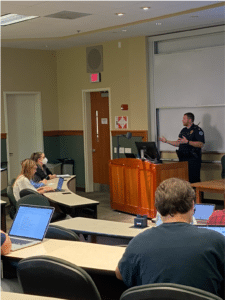Why it’s Newsworthy: Students at the University of Georgia are concerned about campus safety, ways the police department is working to combat crimes, and how mental health is approached by campus police. The UGA police department is refocusing their officer training to be better equipped and prepared for mental health calls and trauma related incidences.
Student mental health crisis calls to the University of Georgia Police Department were down 50% during the pandemic. Maj. Adam Fouche said the reduction in calls for mental health related issues between 2019 and 2020 makes sense because less people were on campus.
“So if you’re a student here in Roswell, you know, you’re remote learning, and you have a crisis, you’re not calling the UGA police, right,” said Fouche. “You’re calling whoever is in service for that area.”
While overall calls to the campus police related to mental health drastically declined, the percentage of suicide attempt calls during the pandemic did not. The UGA Police Department is working to understand the reality of that data.
COVID-19 impacted the mental health of people worldwide, including college students, and it continues to. The daily lives of workers, students, and families were forced to change to accommodate a stay at home order, mask wearing, and social distancing policies.
Now that students are back on campus and in-person learning has picked back up, the campus police are actively refocusing their efforts towards trauma informed training especially after the decline in mental health after the pandemic.
Fouche said that when he first started as an officer, he did not receive adequate training on how to respond to people in crisis. “I was scared. Like, I didn’t know what to say.”

University of Georgia Police Department Maj. Adam Fouche speaks with a group of students on recent crime on campus and how the department handles various situations.
UGA officers now go through a 40 hour crisis intervention team training class in which they become exposed to and familiar with symptoms of common behavioral health disorders. As a result of this training, officers are more comfortable approaching calls related to mental health. Responses to these student crisis calls have increased around 30% every year since 2015.
“I didn’t get that training when I started,” Fouche said. Now, probably the last nine or 10 years or so, maybe, we’ve been giving that training to our officers, and now all of our officers get that. That’s one of the first things they do.”
The department has also partnered with other campus departments such as the School of Social Work and CAPS, the counseling and psychiatric services provider to better benefit their responses to trauma related incidents. They have added trauma-informed interviewing rooms to make the environment safer and more comfortable for any victims.
The UGA Police Department still works to educate their officers and utilize advice from mental health experts to continue the increase in proper responses to trauma related crisis calls from students.
